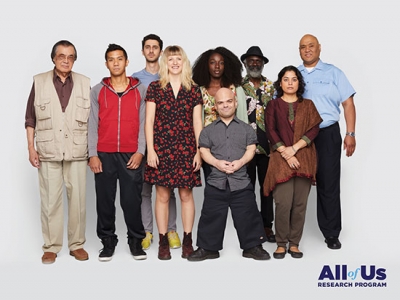 The University of Alabama at Birmingham launched the Southern Network of the All of Us Research Program one year ago, on May 6, 2018. Since then, the network has enrolled 7,111 participants in this historic initiative.
The University of Alabama at Birmingham launched the Southern Network of the All of Us Research Program one year ago, on May 6, 2018. Since then, the network has enrolled 7,111 participants in this historic initiative.
All of Us, spearheaded by the National Institutes of Health, is a national program to accelerate health research and medical breakthroughs, enabling individualized prevention, treatment and care for all of us. The overall aim nationally is to enroll 1 million or more volunteers and oversample communities that have been underrepresented in biomedical research to make the program the largest, most diverse resource of its kind.
UAB heads the Southern Network, comprising Alabama, Mississippi and Louisiana.
“The Southern Network is one of the largest in the All of Us Research Program and provides an opportunity to engage the diverse communities in our region,” said Bruce R. Korf, M.D., Ph.D., UAB’s chief genomics officer. “Our enrollment efforts have gained major momentum over the past year, especially as more and more of our partner sites have come online.
Tulane University began active enrollment April 8, followed by Louisiana State University on April 22. In Alabama, UAB has active enrollment sites at UAB Hospital, Highlands Hospital, and the Kirklin and Whitaker clinics of UAB Hospital, with expansion plans for UAB Medicine clinics in Gardendale and Hoover. Enrollment sites are operating at Cooper Green Mercy Health Services and in Selma, Huntsville, Tuscaloosa and Mobile, with plans to expand to Montgomery soon.
“We are urging the people of our southern region to take advantage of this unique research opportunity,” said Mona Fouad, M.D., director of the UAB Minority Health and Health Disparities Research Center. “This is a chance to directly affect research into diseases that disproportionately impact the South, especially in populations that are traditionally underrepresented in biomedical research. The people of Alabama, Mississippi and Louisiana have a real opportunity to create better health outcomes for generations to come, not just here, but all over the country. We want the program to reflect the rich diversity of the Deep South and to maximize our opportunity to make a positive difference in the future of health care.”
| “This could help identify risk factors for certain diseases, connect people to the right clinical studies, discover which treatments work best for different types of peoples and explore how technology can help people take better care of their health.” |
“We are helping to build one of the largest databases of its kind for health research, one that will reflect the diversity of our region and nation,” Korf said. “All of Us will use the most advanced informatics and genomics approaches available to accelerate discoveries to benefit people from all backgrounds. With the help of volunteers from Alabama, Mississippi and Louisiana, we will open new doors in the prevention and treatment of a host of diseases, some of which have plagued our population for decades.”
Participants are asked to share different types of health and lifestyle information, including through online surveys and electronic health records, which will continue to be collected over the course of the program. Some participants will be asked to visit a local partner site to provide blood and urine samples and to have basic physical measurements taken, such as height and weight. Future plans include utilizing genotyping and whole genome sequencing for all 1 million participants who consent for such analysis.
“Researchers can use these data to better understand health and disease,” said Cora E. Lewis, M.D., chair of the Department of Epidemiology in the School of Public Health and co-PI of the Southern Network. “This could help identify risk factors for certain diseases, connect people to the right clinical studies, discover which treatments work best for different types of peoples and explore how technology can help people take better care of their health.”
All of Us participants are true partners — not subjects — in the project, with ongoing opportunities to help shape the program with their input. Data will be shared with both researchers and participants. Participants will have access to study information and data about themselves, with choices about how much or little they want to receive.
Alabamians age 19 or older, regardless of health status, are eligible to enroll in the program by visiting JoinAllofUs.org/UAB.
The Southern All of Us Network includes the University of Alabama at Birmingham, Cooper Green Mercy Health Services, Huntsville Hospital, Louisiana State University Health Sciences Center, Tulane University, Tuskegee University, UAB School of Medicine’s Montgomery Internal Medicine and Selma Family Medicine programs, UAB School of Medicine’s Huntsville Regional Medical Campus, University of Mississippi Medical Center, University of South Alabama Health System, and University Medical Center in Tuscaloosa.
The Southern All of Us Network is supported under NIH funding award #1OT2OD026548-01. “All of Us” is a registered service mark of the U.S. Department of Health and Human Services.